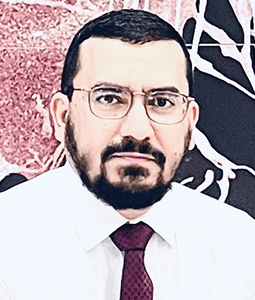School of Medicine Columbia
- SC.edu
- Study
- Colleges and Schools
- School of Medicine Columbia
- About
- Faculty and Staff
- Ahmed Mohammed Ph.D.
Faculty and Staff
Ahmed Dawood Mohammed, Ph.D.
| Title: | Research Assistant Professor |
| Department: | Pathology, Microbiology and Immunology School of Medicine Columbia |
| Email: | Ahmed.Mohammed@uscmed.sc.edu |
| Phone: | 803-216-3447 |
| Office: | SOMC Building 2, Room C22 |

Education
Postdoctoral Fellowship in Immunology, University of South Carolina-School of Medicine (2021- 2024)
Doctor of Philosophy in Biomedical Science May 2021 University of South Carolina (USC) - School of Medicine
Masters in Physiology October 2010 University of Baghdad - College of Veterinary Medicine
Bachelor of Veterinary Medicine July 2001 University of Baghdad - College of Veterinary Medicine
Biography
Dr. Ahmed D. Mohammed is a Research Assistant Professor in the Department of Pathology, Microbiology, and Immunology at the University of South Carolina School of Medicine (USC-SOM). He conducts research in the Cancer Pain Laboratory under Dr. Kandy Velázquez, focusing on elucidating the immunopathology of cancer-associated cachexia. He earned his Ph.D. in Biomedical Science at USC-SOM and completed both his doctoral and postdoctoral training in the lab of Dr. Jason Kubinak, where he gained extensive interdisciplinary training in biomedical sciences with expertise in mucosal immunology and microbial ecology.Dr. Mohammed has a long-standing interest in understanding how immune and platelet networks contribute to systemic inflammation and metabolic dysregulation in cancer-bearing hosts.
His technical expertise lies in high-parameter flow cytometry, including the development of novel panels, assay optimization, data acquisition, and high-dimensional data analysis. He has designed multiple large (>20-marker) flow cytometry panels across diverse murine tissues, including small intestine, muscle, blood, and skin, and is proficient in conventional, spectral, and fully-spectral BD instruments (FACSymphony A5, FACSymphony A5SE, and FACSDiscover S8). He routinely analyzes complex datasets using FlowJo and applies his experience in microbial genomics to provide a systems-level understanding of host–microbe–immune interactions.
Dr. Mohammed has contributed to high-impact publications in journals such as Nature Communications and Frontiers in Immunology, covering topics including mucosal immunity, bacterial bile acid metabolism, inflammation, cancer-associated cachexia, and colitis. Beyond research, he has extensive experience mentoring graduate and undergraduate students, technicians, and faculty, guiding them in experimental design, troubleshooting, data interpretation, manuscript preparation, and grant writing. His work aims to advance translational immunology research while fostering the next generation of biomedical scientists.
Research
Broadly, my research focuses on understanding how immune dysregulation contributes to cancer-associated pain and cachexia, with a strong emphasis on the physiological consequences of tumor–immune–platelet interactions. As a member of the Cancer Pain Laboratory led by Dr. Kandy Velázquez, my work integrates immunology, neurobiology, and cancer biology to investigate how inflammation and metabolic stress shape both systemic immunity and nociceptive signaling.A major component of my work involves defining how chronic inflammation alters immune and platelet phenotypes across blood, tumor, and peripheral tissues. Using high-parameter flow cytometry, I examine changes in T cell functionality, myeloid activation, platelet–immune crosstalk, and B cell dynamics over the course of cancer progression and cancer-associated cachexia. These changes help reveal how dysregulated immune–platelet networks contribute to both heightened pain responses and cancer-associated cachexia.
While my current work centers on tumor–immune–platelet interactions, I also bring extensive expertise in microbiota–immune relationships from my postdoctoral training in mucosal immunology. My background in microbial genomics and 16S rRNA analysis provides an important ecological and evolutionary framework for interpreting how host–microbe interactions influence systemic immunity, inflammation, and cancer biology.
My research approach is highly interdisciplinary, combining advanced cytometry, immunological assays, and ecological thinking with the broader experimental framework established in the Velázquez Lab. Ultimately, my goal is to identify immune and platelet pathways that can be targeted to alleviate cancer-associated pain and improve patient outcomes.